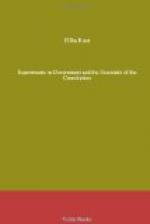than to the electors, and therefore became accustomed
to shape their conduct according to the wishes of
the nominating organization. Accordingly the
real power of government came to be vested to a high
degree in these unofficial political organizations,
and where there was a strong man at the head of an
organization his control came to be something very
closely approaching dictatorship. Another feature
of this system aggravated its evils. As population
grew, political campaigns became more expensive.
At the same time, as wealth grew, corporations for
production and transportation increased in capital
and extent of operations and became more dependent
upon the protection or toleration of government.
They found a ready means to secure this by contributing
heavily to the campaign funds of political organizations,
and therefore their influence played a large part
in determining who should be nominated and elected
to office. So that in many states political organizations
controlled the operations of government, in accordance
with the wishes of the managers of the great corporations.
Under these circumstances our governmental institutions
were not working as they were intended to work, and
a desire to break up and get away from this extra
constitutional method of controlling our constitutional
government has caused a great part of the new political
methods of the last few years. It is manifest
that the laws which were entirely adequate under the
conditions of a century ago to secure individual and
public welfare must be in many respects inadequate
to accomplish the same results under all these new
conditions; and our people are now engaged in the
difficult but imperative duty of adapting their laws
to the life of to-day. The changes in conditions
have come very rapidly and a good deal of experiment
will be necessary to find out just what government
can do and ought to do to meet them.
The process of devising and trying new laws to meet
new conditions naturally leads to the question whether
we need not merely to make new laws but also to modify
the principles upon which our government is based and
the institutions of government designed for the application
of those principles to the affairs of life. Upon
this question it is of the utmost importance that
we proceed with considerate wisdom.
By institutions of government I mean the established
rule or order of action through which the sovereign
(in our case the sovereign people) attains the ends
of government. The governmental institutions of
Great Britain have been established by the growth
through many centuries of a great body of accepted
rules and customs which, taken together, are called
the British Constitution. In this country we have
set forth in the Declaration of Independence the principles
which we consider to lie at the basis of civil society
“that all men are created equal; that they are
endowed, by their Creator, with certain unalienable
rights; that among these are life, liberty, and the
pursuit of happiness. That to secure these rights,
governments are instituted among men, deriving their
just powers from the consent of the governed.”




